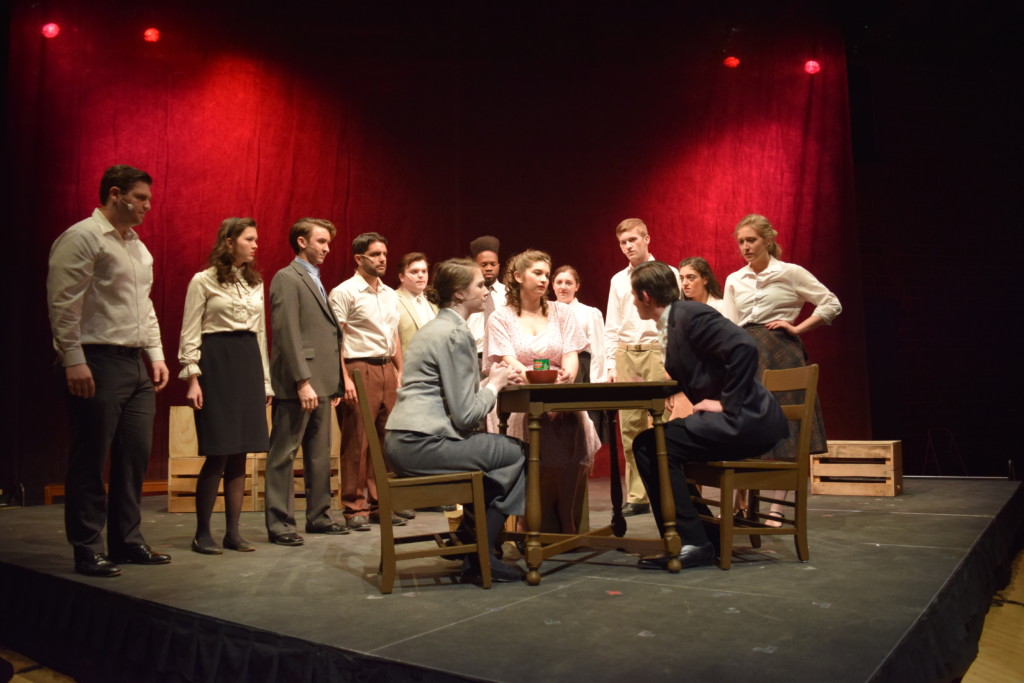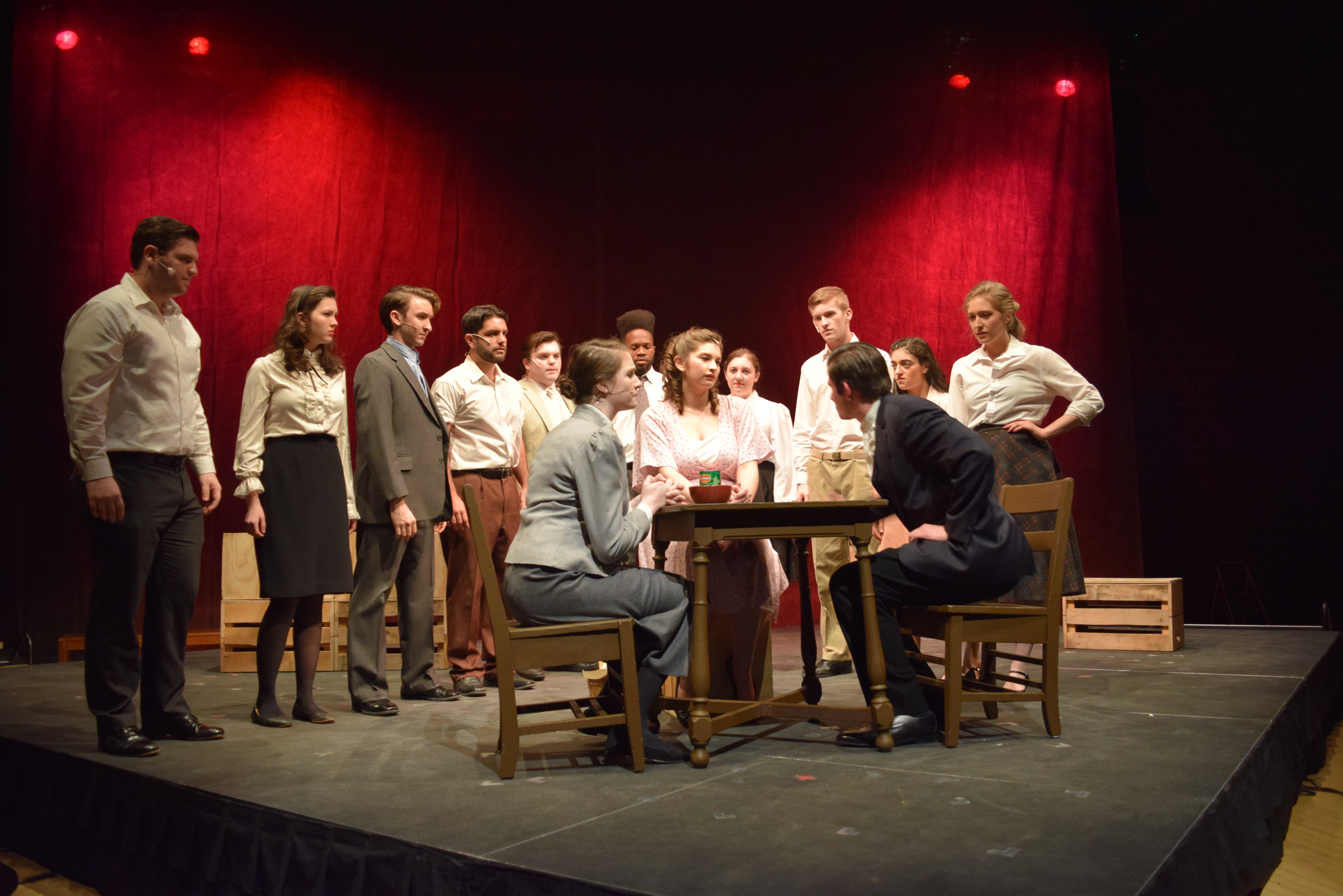If you had described the ROC Players’ performance of the bluegrass musical “Bright Star” to me, I would have hated it just by listening to you.
“It’s nostalgic, folksy, feel-good, and sweet,” you’d say. I’d say it sounds like it’s hollow, simplistic, and dumb. “It’s old-timey and fun, and it’s got Southern charm,” you’d say. Sounds like it’s celebrating a time and place without actually knowing it. Plus, it’s probably condescending to somebody.
So I’m glad nobody told me about it. Because for all of its cliches — oh boy, are there some cliches — “Bright Star,” performed on Friday and Saturday in the May Room, worked. Maybe this is because the Players — led by director sophomore Michael Wizorek — treat their production with such a genuine attitude that it reminds you of how sweetness and nostalgia became cliches in the first place.
Some will find it a bit much, even though I didn’t. This slice of Americana is as treacly as they come, like apple pie dunked in corn syrup and painted by Norman Rockwell.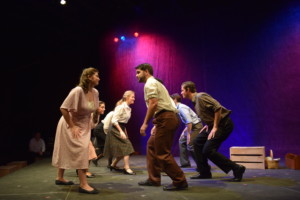 The musical — by Steve Martin and Edie Brickell — follows two storylines, one in the 1940s, and one in the 1920s. In the 1940s, young Billy Cane (first-year Jack Bell) tries to get himself published in a North Carolina literary journal, as a young bookstore worker Margo (stellar senior Maddy Gartenberg) pines for him. In his quest for publication, Billy must get past a sharp and shrewd editor, Alice Murphy (graduate student Sara De Franco).
The musical — by Steve Martin and Edie Brickell — follows two storylines, one in the 1940s, and one in the 1920s. In the 1940s, young Billy Cane (first-year Jack Bell) tries to get himself published in a North Carolina literary journal, as a young bookstore worker Margo (stellar senior Maddy Gartenberg) pines for him. In his quest for publication, Billy must get past a sharp and shrewd editor, Alice Murphy (graduate student Sara De Franco).
In the 1920s, Alice — 23 years younger — falls in love with Jimmy Ray Dobbs (senior Will Cunningham, who’s getting way too good at being heartbreaking), the Mayor’s son, and much melodrama ensues.
The melodrama is, of course, melodramatic, and is only held together by the performances and music.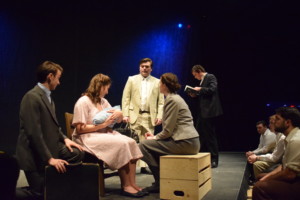
The acting worked smoothly enough in the dialogue scenes, but the performers soared in the musical sequences. Maybe it was because the actors felt more at home in song and dance, or maybe it was because the songwriting was better than the scriptwriting.
Take an early scene, for example, where Billy’s father (senior James Fosburgh) tells him that his mother died while he was away at war. The non-musical part, where Billy asks for his mother while his father tries to figure out how to tell him, was fine, but familiar enough that it didn’t hit viscerally.
But moments later, when Fosburgh sang “She’s Gone,” supported by mournful violins and banjo from the live orchestra, it had a new emotional sting.
The part-bluegrass-bray-part-Broadway-belt vocalizing style, mastered by the performers here, is enormously emotive. “Please, Don’t Take Him” might be the best example of how the intersection of excellent acting, singing, and instrumentati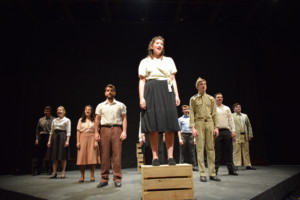 on can make convincing drama out of what could easily be soapy in shakier hands. In this number, junior Casey Brentnall — as the Mayor — plays a fine mustache twirler, and De Franco is memorable as the smart-aleck whose desperation reveals a powerful sincerity.
on can make convincing drama out of what could easily be soapy in shakier hands. In this number, junior Casey Brentnall — as the Mayor — plays a fine mustache twirler, and De Franco is memorable as the smart-aleck whose desperation reveals a powerful sincerity.
But this is a musical, so there are fun and games to accompany the woe. Some of the literary winks are self-congratulatory (this play’s a little too proud of itself for knowing who Eudora Welty is; then again, so am I). But first-year Richard Nessler and, in particular, sophomore Elena Robson are very funny as two of Alice’s bantering underlings at the literary journal.
Robson leads the play’s funniest — and most fun — number, “Another Round,” a rambunctious anthem of intoxication featuring the play’s best choreography. This production, like all ROC Players productions, has to do a lot with the confines of the May Room, so there were times early in the play that found the blocking and choreography a bit stagnant. As the play went on, those elements became more and more dynamic, and by “Another Round,” it was at full bloom. (Senior Charlotte Pillow and first-years Julia Bergel and Kathryn Berger deserve a shout out for their choreography.) By the end, the smaller stage and minimalist sets (by sophomore Delilah Przybyla) were endearing and felt appropriately folksy.
So yes, if you squint, you may notice that you’re watching a simplified, face-value version of America. But squinting takes work, so why bother? If you let go of your desire for cynical stories (as I did), you might find that there is something just as valuable to be found in optimistic storytelling treated with honesty.
